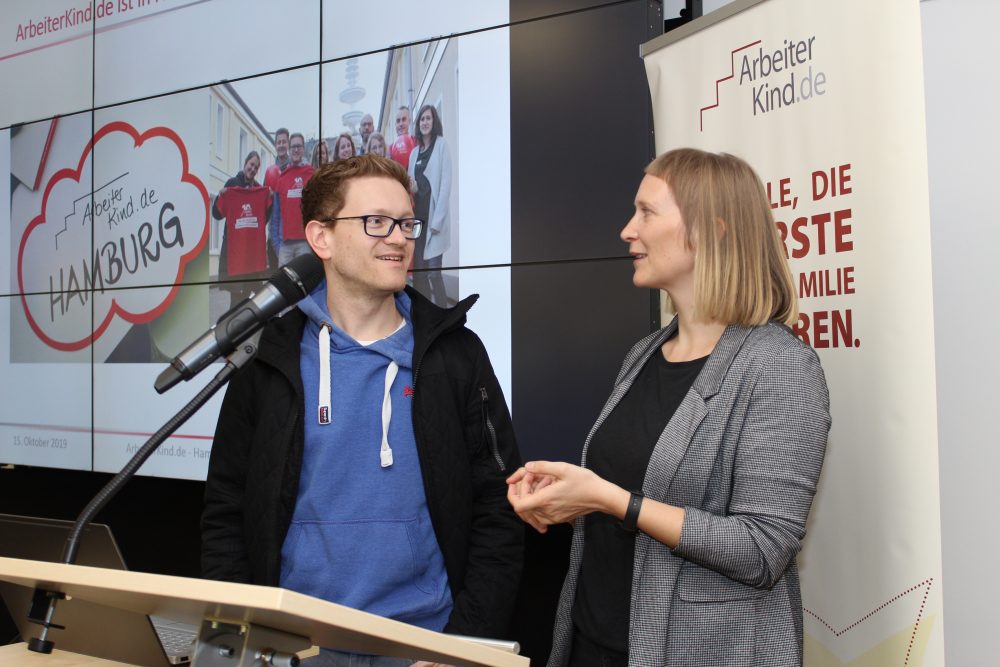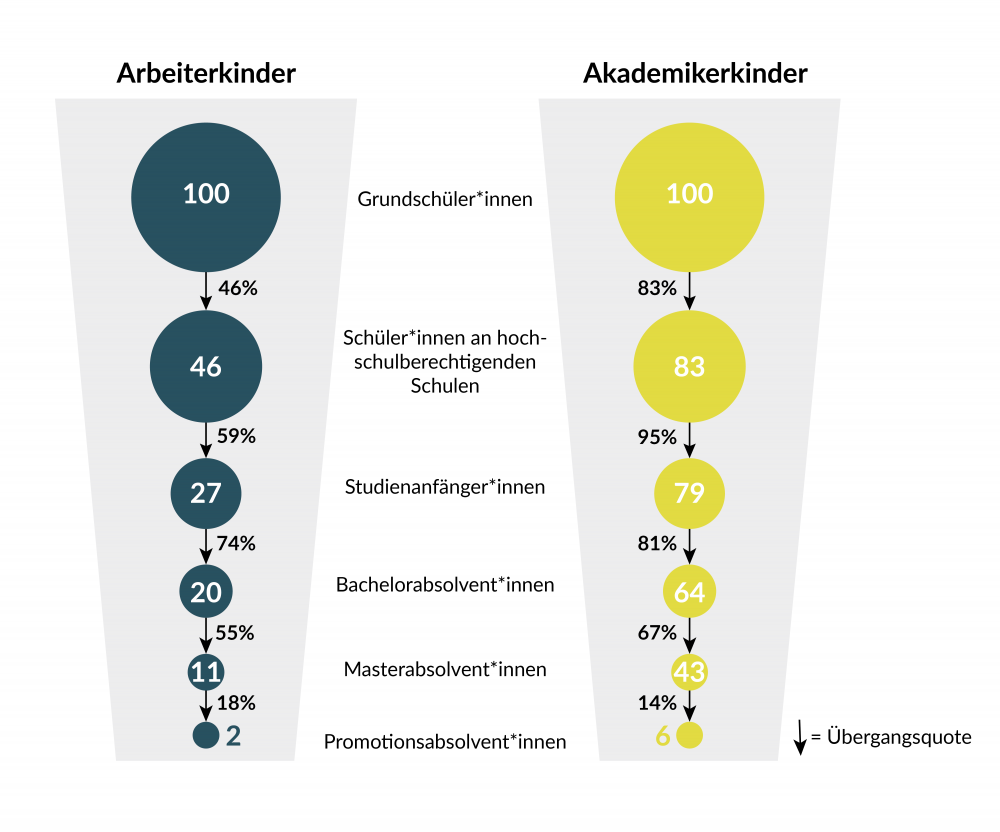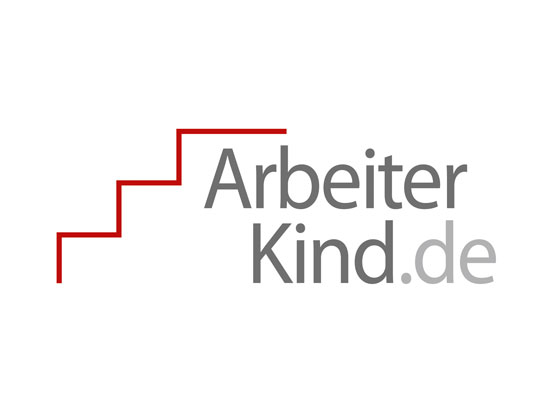Equal opportunities in higher education: How the family background determines our educational path.
The nonprofit organization “ArbeiterKind.de” encourages students from families without university experience to be the first in their family to study and advises them on issues ranging from financing their studies to starting a career later on. We spoke with founder Katja Urbatsch about pigeonholing, BAföG reforms and fears of debt.

Ms. Urbatsch, 71 percent of all children are “workers’ children”. Why do only 27 percent of them study, but 79 percent of “academics’ children” do?
Well, working-class children don’t have academic role models in their families, so studying is less obvious to them. They are also less likely to be able to count on the financial support of their parents, which makes it even more difficult for them to go to college. I know what I’m talking about: I myself am the first academic in my family. Back then, I had to take care of everything myself during my studies and often had the feeling that I was different from others at my university.
How did this personal experience turn into the large “ArbeiterKind.de” network?
I founded ArbeiterKind.de 13 years ago because I thought someone had to do something. At first, it was just a website, but the need was great, and so our network has grown: There are now a good 6,000 volunteers working for us at 80 locations in Germany. They advise prospective students from non-academic families children at schools and education fairs about study opportunities and financing options, and help first generation students in their studies and career entry.
What success are you particularly proud of?
In 2008, hardly anyone had this target group on their radar, but now awareness of the problem has grown: There are initial measures at universities, for example mentoring programs and scholarships. We have managed to get the challenges of first-generation students finally noticed in politics and at universities.
But: the “education funnel” has hardly changed since then. The statistics will not change until we change the structures in the education system.

What structural changes would you like to see?
For me, it’s about attitude. We have an education system with a tendency to pigeonhole supposedly socially weak people at an early age. Children from socially disadvantaged households in particular are often unjustifiably told at an early age that they lack potential. Many are told at school: “You’ll never make it to high school.” This is fatal; such attributions control people and reduce their self-esteem. We experience this problematic form of sorting out at all stages of education, from elementary school to university.
And what about after school?
Structural problems run through the education system. At every single step of the education funnel, there is a high risk of losing first generation students. They have more pressure to finally earn money instead of getting a master’s or a doctorate. In addition, master’s and doctoral places are often limited, which can discourage and exclude students from less privileged homes in particular. In addition, university student services are often poorly attuned to the needs of first-generation students and do not provide them with sufficient support.
In addition, the needs of first-generation students have so far only been given special consideration at some universities, and tailor-made support is often still lacking. We therefore offer awareness-raising workshops for schools and universities to break down prejudices and build understanding for people from non-academic families.
What experiences do first-generation students currently have at universities?
It saddens me that first-generation students are often labeled as less capable. Many simply wish for more understanding: that people would first ask before judging. In reality, they study under more difficult conditions and actually achieve admirable things: they are often more on their own than their fellow students in terms of content and finances. In addition, there are often “additional burdens” such as caring for family members, children, chronic illnesses or additional discrimination, for example due to having a migration background. The more of these factors come together, the more challenging the studies become. And then students need support from their university.
Keyword: Side job – what about the financial situation of working-class children?
Financing studies is one of the biggest challenges and keeps many from studying. Students from financially weak households are usually entitled to BAföG. However, the application process is very bureaucratic, the amount of payments cannot be planned, and the money often arrives too late. This is problematic for students without reserves. In addition, the fear of getting into debt is high – after all, you have to pay back BAföG on a pro-rata basis. And then there are students who do not apply for BAföG because they cannot prove their parents’ income, for example, because there is no contact with one parent.
Or because they do not complete their studies in the standard period of study…
Exactly – of course, this happens especially to students with additional burdens. We have to get away from the fixation on the standard period of study: If we want a diverse student body, the period of study has to become more flexible and we need more part-time courses.
I hope for a BAföG reform with an adaptation to the study conditions of the 21st century. BAföG is a great achievement, but at 50 years old, it is no longer up to date. We need realistic cost estimates, less bureaucracy and more flexibility. I think that a BAföG that is not dependent on parents is a good idea, but I fear that the BAföG rate will then fall and financially weak students will be left behind. I would prefer it if BAföG did not have to be repaid. Then the fear of debt, which scares off many students, would disappear. Unfortunately, BAföG is currently so unattractive that many prefer to take jobs.
What other sources of funding do you inform students about?
We do a lot of advertising for scholarships. These are often little known, but only one to two percent of students receive a scholarship. And then, of course, there are loans and ISAs. These are especially important for those who are not eligible for BAföG. That’s why I think the new living expenses offer from CHANCEN eG is good: it supports in particular those who otherwise have no opportunities. You do have to pay back the ISA, but you don’t have any fixed debts, which is a big advantage.

Students and prospective students from non-academic families are welcome to attend ArbeiterKind’s free workshops and counseling services. For more info, visit www.ArbeiterKind.de.

